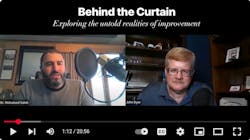Unlocking Team Success: Effective Team Dynamics
Friction and conflict are not the hallmarks of a team destined to solve important problems or make difficult decisions, but it’s a phase teams typically go through. Called the storm phase, the key is to get through it as quickly as possible because the longer it goes on, the more destructive it is to the team.
In this episode of Behind the Curtain: Adventures in Continuous Improvement, podcast co-hosts Professor Mohamed Saleh and John Dyer delve into what it takes to get past team conflict and move toward fostering productive team dynamics.
They speak about the importance of a neutral facilitator to manage team conflicts and the significance of a structured meeting agenda, specifically the introductory block in which team members share their expectations and the team sponsor discusses the importance of the team.
This activity is so important, says Dyer, “because the root cause of most disruptive behaviors on a team is the lack of understanding of the question, ‘Why am I here?’”
Not only does a shared mental model surrounding the team’s purpose play a role in team dynamics, adds Saleh, but so too does the perspective of how team members view the purpose, their situational awareness, and their behaviors.
“How are the team behaving to each other? Are they in the moment and actually listening to understand from each other or are they listening to respond?” he says. “Do they view each other from an authentic and humanistic standpoint? Do they model high performance themselves?”
The continuous improvement experts also discuss the importance of icebreakers or team-building exercises. “It gives us a shared experience, something we can talk about the rest of the time we're together,” notes Dyer.
And don’t overlook the importance of how a team meeting concludes. “It's a missed opportunity for many leaders who have big teams, or have teams in general, who don't end the meeting on a reflection point,” says Saleh. “They don't need a survey to find out if they did good or bad. They just need to know right there and then, ‘What could we have done better?’”
